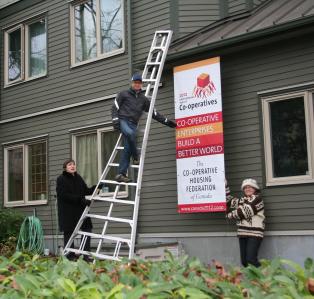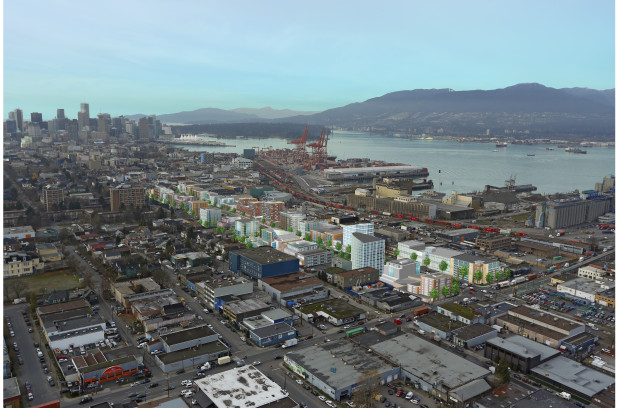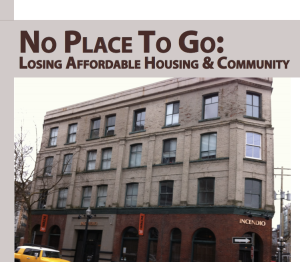Category: Housing
[Podcast] Local Filmmaker Aims to Document Little Mountain Social Housing Struggle
The importance of the Little Mountain story and one filmmaker’s campaign to capture the struggle through a documentary film
Subscribe to the weekly podcast here.
David Vaisbord discusses the importance of the Little Mountain story and his campaign to create a documentary film to showcase the community and residents’ struggle against the BC government.The Little Mountain story centres around Little Mountain residents – many of them seniors – fighting to remain in their apartments in Vancouver’s first social (public) housing development and demanding demolished social housing units be replaced on the site.
Ultimately, the community and remaining tenants scored a victory – the remaining tenants were not evicted and construction of some of the replacement social housing units is underway.
Find out more about David’s campaign to produce a full-length documentary – and how you can help.
[Podcast] From Emergency Services to Permanent Solutions: Addressing Youth Homelessness
Stephen Gaetz discusses the problem of youth homelessness and how we can develop permanent solutions
 Listen to the program. Subscribe to the weekly podcast.
Listen to the program. Subscribe to the weekly podcast.
One in five shelter users are youth. 25 to 40% of youth experiencing homelessness self-identified as LGBTQ, and 40 to 70% of homeless youth have mental health issues compared to 10 to 20% of housed youth.
On the program, we discuss the crisis of youth homelessness in Canada and how we might better respond to the problem, as well as the broader context of Canadian homelessness and the structural dimensions fuelling the situation.
Dr. Stephen Gaetz is associate professor in the faculty of education at York University in Toronto and he is the director of the Canadian Homelessness Research Network. He is the author of a new report – Coming of Age: Reimaging the Response to Youth Homelessness in Canada.
[Podcast] Realizing the Right to Adequate Housing
 Miloon Kothari discusses his work as the UN Special Rapporteur on the Right to Adequate Housing and how this right can be realized in practice
Miloon Kothari discusses his work as the UN Special Rapporteur on the Right to Adequate Housing and how this right can be realized in practice
Listen to the program. Subscribe to the weekly podcast here.
Miloon Kothari is the former UN Special Rapporteur on the Right to Adequate Housing, and he spoke at Simon Fraser University–Woodward’s on July 9, 2012.
Mr. Kothari’s talk is titled The Right to Adequate Housing: From Practice to Policy to Practice. He discusses his work as Special Rapporteur, the similar and distinct challenges facing a variety of countries and cities, specifically Vancouver, and how the right to adequate housing can be realized.
Thank you to SFU’s Vancity Office of Community Engagement for permission to broadcast this talk.
[Podcast] ‘Red Zones’ and Vancouver’s Criminal Justice System

Vancouver’s Downtown Eastside. Photo Credit: Anonymous, via Wikimedia Commons.
Will Damon explains the rise of administration of justice offences – specifically area restrictions – and the impact on marginalized groups
Listen to the podcast and subscribe here.
On the podcast, Will Damon, a recent graduate of Simon Fraser University’s MA program in human geography, discusses the rise of administration of justice offences – typically breaches of bail and probation – in Canada and BC, and use of particular spatial practices in Vancouver’s criminal justice system.
Are particular criminal justice practices setting marginalized groups up to fail in the criminal justice system? And how do these practices affect how people negotiate urban neighbourhoods?
Documentary on Grandview-Woodland Planning Process
Simon Fraser University student John Nguyen recently produced this timely documentary – Grand View – on the east Vancouver Grandview-Woodland neighbourhood planning process. The film provides a variety of perspectives on the process and opposition. The City‘s host and producer Andy Longhurst is featured in the documentary. You can find The City‘s special radio documentary on the topic here.
[Podcast] Existing Affordable Housing at Risk: Housing Co-op Sector Faces Looming Crisis as Federal Agreements Expire
Between now and 2017, one quarter of housing co-operatives in BC will lose rent-geared-to income subsidies for low-income members as federal housing agreements end. Over 1500 households will face a crisis as their homes become unaffordable.
On the podcast, Co-operative Housing Federation of BC’s Thom Armstrong discusses this situation and how this affects the affordable housing landscape in Vancouver, across BC and Canada – and how the expiry of these agreements threatens to make low-income co-op residents homeless. UBC legal scholar Dr. Margot Young encourages us to rethink the language we use to talk about housing – and discusses the right to housing and, more broadly, the right to the city.
[Podcast] Approved Downtown Eastside Plan Raises Gentrification and Social Housing Concerns
Vancouver’s recently approved Downtown Eastside neighbourhood plan has raised concerns over the definition of social housing and the plan’s ability to stop – or even slow – gentrification. Low-income advocates and others expressed frustration that the significant 30-year plan was rushed through City Council.
On the podcast, we hear from low-income advocate Tamara Herman (Carnegie Community Action Project), Vancouver Mayor Gregor Robertson (courtesy of City Hall Watch), Green Party Councillor Adriane Carr, and urban planning/geography PhD student and researcher Melissa Fong.
[Podcast] No Place to Go: Gentrifying Downtown Eastside Residential Hotels Increasingly Unaffordable for Low-Income Residents
Seven hundred and thirty-one homeless people live in the Downtown Eastside (DTES) according to the City of Vancouver. Approximately 5,000 more live on the edge of homelessness in tiny Single Room Occupancy (SRO) hotel rooms, with no private kitchen or bathroom, and often poor management, mice, rats, cockroaches and bedbugs. Most of these people rely on welfare and basic pension and desperately need new self contained social housing. –Carnegie Community Action Project
The Carnegie Community Action Project’s (CCAP) 2014 hotel and housing report finds that SROs in the DTES are more expensive than ever and that fewer still are available to low-income individuals looking for rooms.
On the podcast, I speak with Rory Sutherland, who is co-author of the report, No Place to Go: Losing Affordable Housing and Community. In the conversation, Rory outlines the major findings of the report, how they know SROs are gentrifying, and the implications for homelessness if this ‘last stop’ housing stock no longer houses the low-income people that depend on it.
[Podcast] Celebration Capitalism and the Olympic Games
 Jules Boykoff on celebration capitalism, dissent, and the Olympic Games in Vancouver, London, and Sochi
Jules Boykoff on celebration capitalism, dissent, and the Olympic Games in Vancouver, London, and Sochi
Jules Boykoff discusses the Olympics Games – prominent urban mega-event spectacles – as a form of ‘celebration capitalism’ (the complement to Naomi Klein’s disaster capitalism). He talks about celebration capitalism and political dissent in the context of the Vancouver, London, and Sochi Olympic Games.
Jules Boykoff is author of Celebration Capitalism and the Olympic Games (2013) and Activism and the Olympics: Dissent at the Games in Vancouver and London (forthcoming), “Fun at the Games: The Anti-Olympics” (New Left Review, 2011) among many other publications in both academic and popular publications. He is associate professor of politics and government at Pacific University in Oregon.
[Podcast] Vancouver: Consumption City Forever?
Part two of the conversation with urban economic geographer Elliot Siemiatycki about Vancouver’s future economic trajectory
On the program, the second part of the conversation with urban economic geographer Elliot Siemiatycki about Vancouver’s transformation from a productive city into a city of consumption, dominated increasingly by real estate and tourism. We discuss what the future might hold for Vancouver as a city of consumption – and whether it might be advantageous for the city to chart an alternative economic path forward.
Dr. Elliot Siemiatycki is a postdoctoral fellow at York University in Toronto, and he completed his PhD from the University of British Columbia in 2013. His PhD research examined Vancouver’s urban economic transformation over the last three decades in his dissertation – Consumption City: Precarious Labour and Capital in Vancouver, British Columbia.




